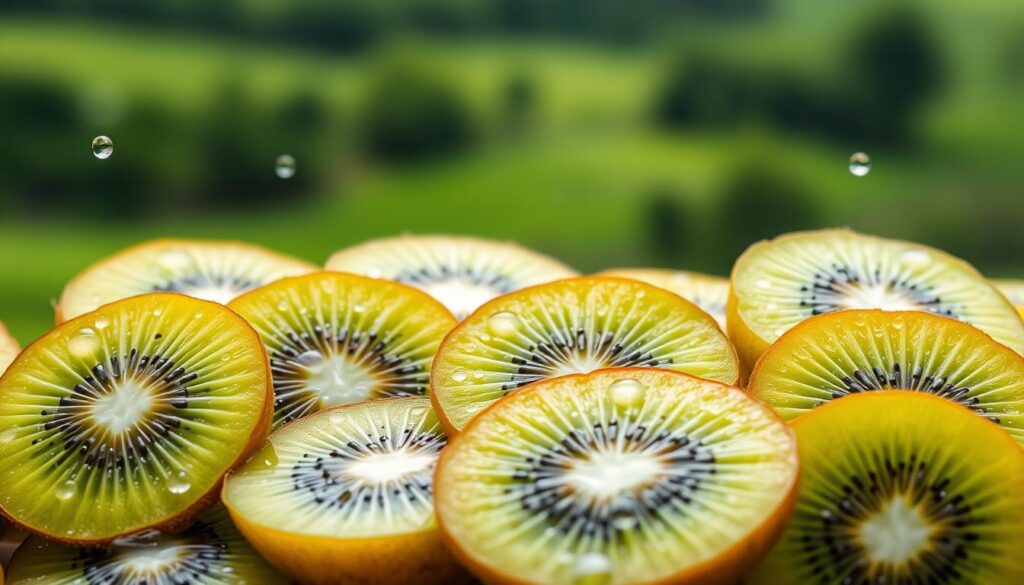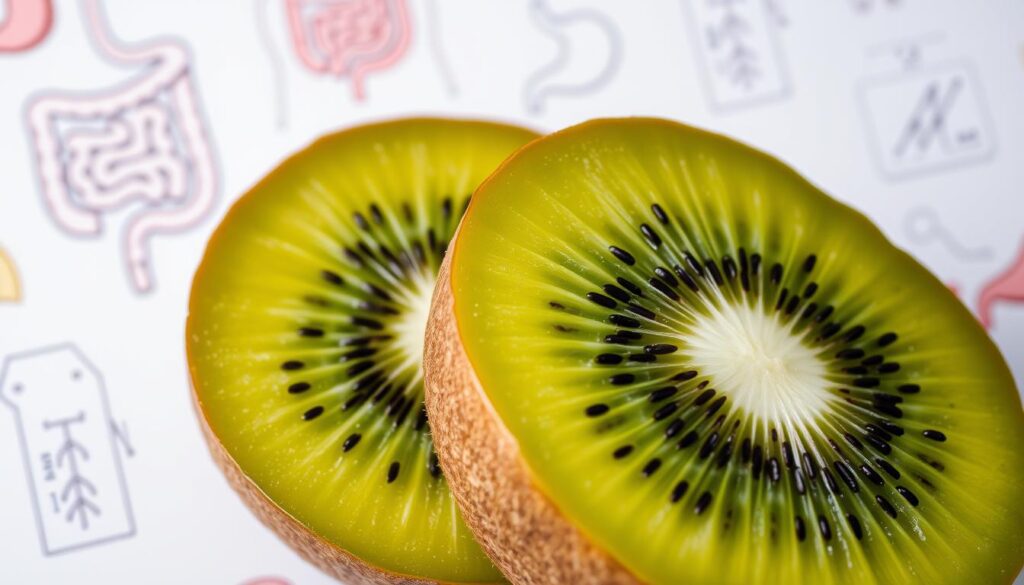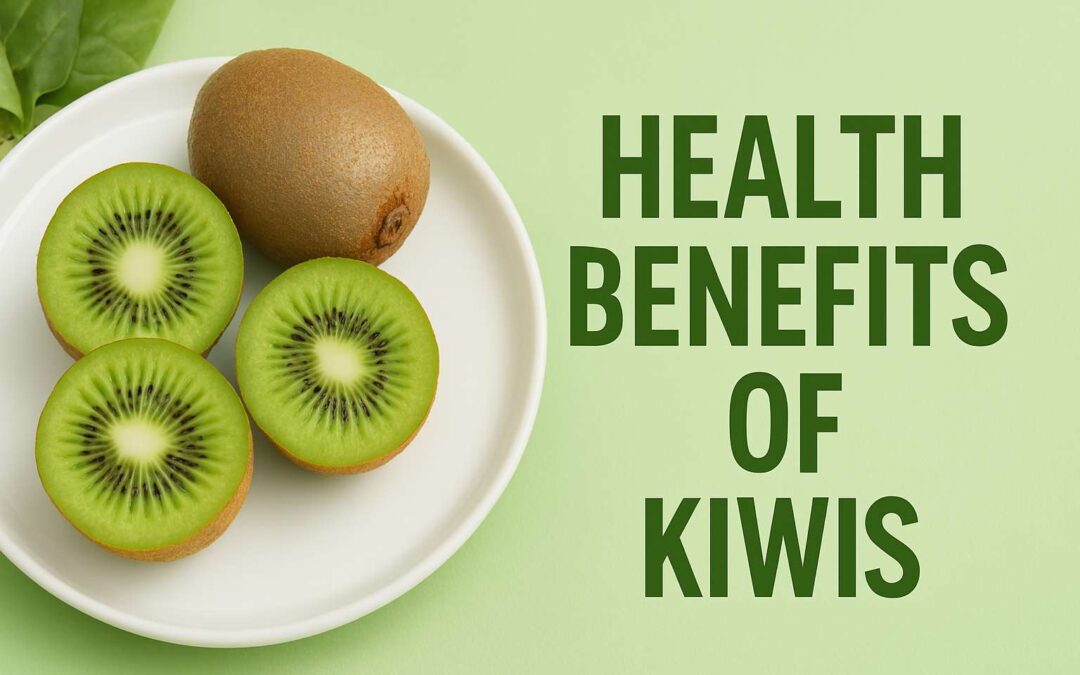Kiwis are often ignored in the grocery store. But they are a superfood that we should pay attention to. They are small and fuzzy but full of nutrition. They have lots of vitamins, minerals, and antioxidants that are good for us.
They help with digestive health and boost our immune system. This makes kiwis a powerful fruit.
Why are kiwis healthy? It’s because of their nutrition facts. One kiwi has 64 milligrams of vitamin C, more than an orange. Vitamin C improves our immune system and skin.
Kiwis also have a lot of dietary fiber. They have 5 grams per 1-cup serving, mostly in the skin. This fiber helps with digestive health and keeps us full.
Kiwis are full of vitamins and minerals. They are rich in vitamins K and E. Additionally, they contain more potassium than iceberg lettuce or peanut butter.
Kiwis are also full of antioxidants. They have plant compounds that fight off bad stuff. Eating kiwis can help fight stress and inflammation.
Key Takeaways
- Kiwis are a nutrient-dense fruit that contains vitamins, minerals, and antioxidants.
- A single kiwi contains more vitamin C than two oranges, which promotes immune function.
- Kiwis are high in dietary fiber, which helps with digestion and satisfaction.
- These fruits contain significant amounts of vitamin K, vitamin E, and potassium.
- The potent antioxidant profile of kiwis may help combat oxidative stress and inflammation.
Page Contents
- The Nutritional Profile of Kiwis
- Why Kiwis Are Low in Calories
- The Fiber Content in Kiwis
- Vitamin C: A Key Benefit of Kiwis
- The Importance of Potassium from Kiwis
- Kiwis and Digestive Health
- Antioxidants in Kiwis and Their Benefits
- Kiwis as a Natural Sleep Aid
- Kiwis and Blood Sugar Management
- Incorporating Kiwis into Our Diet
- Potential Allergies and Side Effects of Kiwis
- Conclusion: Embracing Kiwis for Better Health
- FAQs
The Nutritional Profile of Kiwis
Kiwis are full of good stuff like vitamins, minerals, and antioxidants. They help keep us healthy. A 100-gram kiwi has 64 calories, 14 grams of carbs, and 3 grams of fiber. It also has 0.44 grams of fat and 1 gram of protein.
Vitamins and Minerals Found in Kiwis
Kiwis are super high in vitamin C. One 100-gram serving gives us 83% of what we need every day. Vitamin C is key for our immune system and skin.
Kiwis also have vitamin E, vitamin K, folate, copper, potassium, and magnesium. These are all important for our health.
| Nutrient | Amount per 100g | % Daily Value (DV) |
|---|---|---|
| Vitamin C | 92.7 mg | 83% |
| Vitamin E | 1.5 mg | 9% |
| Vitamin K | 40.3 mcg | 34% |
| Folate | 25 mcg | 7% |
| Copper | 0.13 mg | 15% |
| Potassium | 312 mg | 4% |
| Magnesium | 17 mg | 4% |
The Role of Antioxidants
Kiwis are a good source of antioxidants like lutein and zeaxanthin. These help keep us healthy. A study found that eating foods rich in carotenoids can lower depression risk.
Kiwis also have caffeic acid and chlorogenic acid. These are strong antioxidants. Compared to apples, grapefruits, and pears, they are more powerful.
Macronutrients in Kiwis
Kiwis are abundant in protein and fiber, yet low in calories and fats. The fiber in kiwis helps with digestion. It makes bowel movements regular.
Constipation can be relieved by eating two kiwis a day for four weeks. Due to their low calorie content, kiwis are beneficial for weight management.
Why Kiwis Are Low in Calories
Kiwis are great for those who want to eat healthy and not gain weight. They have few calories but are very tasty. A single kiwi weighs about 70g and has about 37 calories.
Ideal for Weight Management
Kiwis have fewer calories than bananas and grapes. They are perfect for those who want to eat less but not give up flavor. Kiwis are mostly water and fiber, which keeps their calorie count low.
Here’s a quick comparison of the calorie content in various fruits per 100g serving:
| Fruit | Calories per 100g |
|---|---|
| Kiwi | 62 |
| Banana | 89 |
| Grapes | 69 |
| Apple | 52 |
Satisfying and Filling
Kiwis are low in calories but also high in nutrients. One kiwi has about 2g of fiber. This helps us feel full and satisfied.
“”Kiwis are an excellent addition to any weight-management approach. Their low calorie content and high fiber content make them a satisfying snack that won’t derail your progress.” – Jane Reagon, Registered Dietitian
Adding kiwis to our diet is a smart choice. They are tasty and help us stay on track with our weight goals. So, next time you need a healthy snack, try a kiwi.
The Fiber Content in Kiwis
Kiwis are tasty and full of nutrients, like fiber. One kiwi has 2.07 grams of fiber. This makes them a great fruit for our daily fiber needs.
Two little kiwis contain more fiber than an orange. This shows how much fiber kiwis have.
Kiwis have both soluble and insoluble fiber. Soluble fiber is about one-third, and insoluble fiber is two-thirds. This mix helps our digestion and health. Eating kiwis is a fun way to get more fiber.
How Fiber Supports Digestive Health
Fiber in kiwis helps our digestion. Soluble fiber feeds good bacteria in our gut. This keeps our gut healthy.
It also helps with digestion, reduces inflammation, and boosts our immune system. Insoluble fiber makes our stool bulkier. This helps it move better and prevents constipation.
Eating kiwis can solve many digestive problems. It can ease stomach pain, indigestion, and acid reflux. It also lowers the risk of some gut diseases.
The fiber in kiwis keeps us healthy and feeling good. It supports our digestion and overall well-being.
The Benefits of Soluble vs. Insoluble Fiber
Soluble and insoluble fiber are both good for us. Soluble fiber lowers cholesterol, stabilizes blood sugar, and makes us feel full. This helps with weight control.
Insoluble fiber doesn’t dissolve in water. It helps prevent constipation by making our stool bulkier. This keeps our bowel movements regular.
| Fiber Type | Benefits |
|---|---|
| Soluble Fiber |
|
| Insoluble Fiber |
|
Eating kiwis provides both soluble and insoluble fiber. This supports our kiwi digestive health and overall health. Kiwis are tasty and nutritious, making them a great choice for fiber.
Vitamin C: A Key Benefit of Kiwis
Kiwis are packed with vitamin C. Vitamin C maintains healthy skin and strengthens the immune system. Eating kiwis is a tasty way to get more vitamin C.

Strengthening Our Immune System
For a strong immune system, vitamin C is essential. It helps our immune cells work well. Two kiwis give us about 120 mg of vitamin C, which is what most adults need every day.
Every day, women require 75 mg of vitamin C, while males require 90 mg. A study in Foods found that two green kiwis or one SunGold kiwi meet our daily vitamin C needs.
Eating kiwis regularly might make colds shorter. Vitamin C in foods is better than supplements. Supplements don’t always work as well as food does.
Supporting Skin Health
Vitamin C also helps our skin. It makes collagen, which makes our skin look better. Kiwis have lots of vitamin C, which helps our skin look bright and even.
SunGold kiwis have 130 mg of vitamin C per 80 g serving. That’s over 290% of what we need every day.
Eating kiwis helps our immune system and skin. We can choose green or gold kiwis. They’re tasty and good for us.
The Importance of Potassium from Kiwis
Kiwis are great for our heart and blood pressure. They are full of potassium. This makes them a tasty way to keep our heart healthy.
Kiwis are packed with potassium. Two Zespri Green kiwis give us 462 mg of potassium. That’s 13% of what we need every day. Two Zespri SunGold kiwis give us even more, 520 mg of potassium. That’s 15% of what we need.
Regulating Blood Pressure
Kiwis help keep our blood pressure right. They work with sodium to keep our body fluids balanced. This balance is key to keeping our blood pressure in check.
Studies show kiwis can lower blood pressure. This is accurate for those with mildly high blood pressure.
Promoting Heart Health
Kiwis are also good for our heart. Potassium in kiwis helps our heart muscle work right. Eating kiwis helps our heart stay strong and work well.
Kiwis are better than bananas for potassium. There are approximately 422 mg of potassium in a banana. But kiwis have more. Eating kiwis regularly helps our body get the potassium it needs.
Kiwis and Digestive Health
Kiwis are tasty and good for our stomachs. They have fiber and enzymes that help our gut stay healthy.

The Role of Actinidin
Kiwis have a special enzyme called actinidin. It helps break down proteins in our stomach and small intestine. This makes digestion easier and helps avoid stomach pain.
Studies show green kiwis have 8 times more actinidin than gold kiwis. This enzyme is in the fruit’s flesh. In our small intestine and stomach, it helps in the breakdown of proteins.
Research with 661 people showed kiwis help with stomach problems. They used a scale to measure symptoms. Kiwi eaters saw their pain and indigestion scores go down.
Supporting Gut Health
Kiwis are also full of fiber. Two small kiwis have 2.0g of fiber. Fiber is key for a healthy gut.
Fiber in kiwis helps with bowel movements. It makes stools easier to pass. This is great for people with constipation.
Kiwis’ fiber and actinidin also support necessary microorganisms in our digestive tracts. Eating kiwis regularly can make our digestive system better. It might even help with stomach problems that affect many people.
“Kiwifruit improve bowel movement frequency, reduce straining, and enhance stool consistency in individuals with constipation.”
Kiwis have been used for stomach issues in Chinese medicine for centuries. Adding kiwis to our diet can help our gut health. It’s a tasty and healthy way to do it.
Antioxidants in Kiwis and Their Benefits
Kiwis are full of antioxidants. They help protect our bodies from harm. These antioxidants fight off free radicals and reduce inflammation.
Studies show eating kiwis boosts our body’s antioxidants. In one study, runners who ate two yellow kiwis a day for a month had more antioxidants. Another study found that runners with high stress levels also saw an increase in antioxidants after eating two yellow kiwis a day for two months.
How Antioxidants Combat Free Radicals
Free radicals harm our cells. Kiwi antioxidants stop these harmful molecules. Eating kiwis helps protect our cells and lowers disease risk.
| Country | Kiwi Production (TMT) |
|---|---|
| China | 2380.79 |
| New Zealand | 628.5 |
| Italy | 416.06 |
Reducing Inflammation
Inflammation is our body’s way to fight off harm. But too much can lead to diseases. Kiwi antioxidants help reduce this inflammation, lowering disease risk.
Vitamins E and C, minerals, carotenoids, polyphenols, ascorbic, folic, citric, and glutamic acid, as well as phenolic and lipid bioactives, are all present in kiwi fruit and its byproducts.
Eating kiwis boosts our health. They taste great and are easy to add to our diet. Kiwis help us stay healthy and feel good.
Kiwis as a Natural Sleep Aid
Getting good sleep is key for our health. Instead of using medicines, kiwis might be a better choice. Studies show that eating kiwis can make our sleep better and longer.
The Connection Between Kiwis and Sleep Quality
Two kiwis before bed proved to be quite beneficial, according to a study including 24 participants ages 20 to 55. They slept faster and woke up less. They also felt their sleep was much better.
After eating kiwis, people slept more efficiently and for longer. This shows kiwis can help us sleep better naturally.
Nutrients That Promote Better Sleep
Kiwis have nutrients that help us sleep. Serotonin in kiwis helps control our sleep-wake cycle. This is why kiwis might make our sleep better.
Kiwis also have melatonin, which helps us sleep well. Eating two kiwis every day increases vitamin C levels. This helps our immune system and sleep too.
| Nutrient | Role in Sleep |
|---|---|
| Serotonin | Regulates sleep-wake cycles |
| Melatonin | Promotes restful sleep and regulates circadian rhythm |
| Vitamin C | Supports better sleep through antioxidant and immune-boosting properties |
| Folate | Contributes to the production of serotonin and melatonin |
Eating kiwis every day helps our body make sleep-promoting nutrients. This may improve our health and quality of sleep.
Kiwis and Blood Sugar Management
Kiwis are tasty and good for blood sugar. They have a GI of 50 and a GL of 7.3. This means they don’t make blood sugar go up too fast. They’re great for people with diabetes or anyone who wants stable blood sugar.
Kiwis have a lot of fiber. Fiber helps slow down sugar absorption. This prevents an excessive rise in blood sugar. Doctors say we should eat one kiwi a day for its fiber and vitamin C.
Low Glycemic Index Advantages
Kiwis have a low GI. This means they’re absorbed slowly, causing blood sugar to rise slowly.This will help people who have diabetes or are at risk for it. Eating low GI foods like kiwis helps manage blood sugar and lowers diabetes risks.
Here’s what’s in kiwis per 100 grams:
| Nutrient | Amount per 100g |
|---|---|
| Energy | 64 kCal |
| Protein | 1.06 g |
| Carbohydrates | 14 g |
| Fiber | 3 g |
| Sugars | 8.99 mg |
| Calcium | 35 mg |
| Vitamin C | 74.7 mg |
| Beta Carotene | 52 µg |
| Lutein + Zeaxanthin | 122 µg |
Impact on Insulin Sensitivity
Kiwis also help with insulin sensitivity. Insulin helps glucose get into our cells. When we’re less sensitive to insulin, blood sugar can rise. Eating kiwis regularly might make us more sensitive to insulin, helping with glucose management.
Kiwi is a nutrient-dense fruit that offers a range of health benefits, including improved blood sugar control and enhanced insulin sensitivity.
Kiwis also have a lot of vitamin C. Vitamin C helps lower inflammation from high blood sugar. It also helps our bodies grow and fight off sickness. Eating kiwis helps keep our blood sugar healthy and lowers diabetes risks.
Incorporating Kiwis into Our Diet
Kiwis are a fun and healthy fruit to add to our meals. They taste sweet and tangy. Let’s look at some yummy kiwi recipes and ways to enjoy them.

Delicious Recipes with Kiwis
Kiwis work well in a variety of savory and sweet recipes. Here are some tasty ideas:
- Kiwi and Strawberry Fruit Salad: Mix diced kiwis, strawberries, and honey for a colorful salad.
- Blend the banana, milk, yogurt, and kiwis to create a creamy Kiwi Smoothie Bowl. Add granola, nuts, and more kiwi for a great breakfast or snack.
- Make a spicy salsa by combining kiwis, red onion, jalapeño, cilantro, and lime. It’s great with grilled chicken or fish.
- Kiwi and Avocado Toast: Spread mashed avocado on toast and top with kiwi slices for a tasty and healthy snack.
Creative Snack Ideas
Kiwis are great as snacks alone or with other foods. Here are some kiwi snack ideas:
| Snack Idea | Preparation |
|---|---|
| Kiwi Popsicles | Blend kiwis with coconut water and freeze in popsicle molds for a cool treat. |
| Kiwi and Cheese Skewers | Thread kiwi and cheese cubes onto skewers for a protein-rich snack. |
| Kiwi and Nut Butter | Fill a kiwi half with almond or peanut butter for a tasty and healthy snack. |
| Kiwi Chips | Dehydrate kiwi slices in the oven or dehydrator for a crunchy snack. |
As an added source of fiber and nutrients, did you know that eating kiwi peel is safe? Just eat the entire kiwi after thoroughly cleaning it.
Adding kiwis to our meals and snacks provides numerous health benefits. It also makes our food more interesting. Thus, let’s incorporate kiwis into our diet in an innovative way.
Potential Allergies and Side Effects of Kiwis
Kiwis are tasty and good for you, but some people might have allergies or side effects. Over 30 years, some people have reacted to kiwis. In places like Denmark and Sweden, kiwi is a common allergy.
Avocados, bananas, and kiwis can also cause reactions in those with latex allergies. This is because these foods contain chemicals comparable to latex. Kids might be more likely to have food allergies, but they might get better as they grow up.
Common Reactions to Kiwis
Kiwi allergies can cause mild or serious symptoms. These may impact the lungs, heart, stomach, and skin. Some common symptoms include:
- Abdominal pain
- Hives
- Wheezing
- Shock
- Hoarse throat
- Anaphylaxis
Up to 25% of children with allergic rhinitis develop Oral Allergy Syndrome (OAS) after eating fruits such as kiwi. Kiwi allergy can be mild or severe and change over time.
Tips for Trying Kiwis Safely
If you think you might be allergic to kiwis, see an allergist. Start with a small amount and watch for any bad reactions. Cooking kiwi might make it safer for some people.
Always carry antihistamines or an EpiPen if you have a severe allergy. Tell others about your food allergies to avoid serious reactions.
| Kiwi Variety | Potential Allergen |
|---|---|
| Actinidia deliciosa | Act d 1, Act d 2, Act d 5 |
| Actinidia chinensis | Act c 1, Act c 2 |
There are six types of kiwi, and each might cause different reactions. If you’re allergic to kiwi, you might also react to other foods with similar compounds.
Conclusion: Embracing Kiwis for Better Health
Kiwis are packed with nutrients and offer many health benefits. They are full of kiwi nutrition benefits. Adding kiwis to our diet can greatly improve our health.
Recap of Health Benefits
Kiwis are rich in vitamin C, giving us up to 273% of what we need. They also have lots of dietary fiber, about 2.1 grams in a medium kiwi. These nutrients help our immune system, digestion, heart, blood sugar, and sleep.
Kiwis also help our mouths by making saliva and breaking down plaque. This keeps our mouths healthy.
Encouragement to Enjoy More Kiwis
There are many reasons to eat more kiwis. They are tasty and easy to add to many foods. So, let’s make kiwis a part of our diet for better health. Your body will be happy!
FAQs
What makes kiwis such a healthy fruit?
Kiwis are full of vitamins, minerals, and antioxidants. They help our health in many ways. They are rich in vitamin C, fiber, potassium, vitamin E, and folate.
Are kiwis low in calories?
Yes, kiwis have only about 42 calories per fruit. They are also full of nutrients. This makes them great for those watching their calories or managing their weight.
How does the fiber in kiwis benefit our digestive health?
Kiwis have both soluble and insoluble fiber. Soluble fiber feeds good gut bacteria. Insoluble fiber makes stool bulkier and helps it move through the digestive system.
Can kiwis help boost our immune system?
Yes, kiwis are high in vitamin C. Vitamin C helps our immune system work well. Eating kiwis can keep our vitamin C levels up.
Are kiwis good for heart health?
Kiwis are a good source of potassium that helps to control blood pressure and is good for the heart. Eating kiwis may lower blood pressure in people with slightly high levels.
Do kiwis have any benefits for sleep?
Yes, kiwis can improve sleep quality. They contain serotonin, which helps regulate sleep. They also have folate, which helps make serotonin and melatonin, important for sleep.
Can people with diabetes eat kiwis?
Yes, kiwis are safe for people with diabetes. They have a low glycemic index, which means they don’t raise blood sugar quickly. Their fiber also helps control blood sugar.
How can we incorporate kiwis into our daily diet?
Kiwis are easy to add to our diet. We can put them in fruit salads, smoothies, or on yogurt or oatmeal. They’re also good in salsa or baked goods.
Are there any potentially side effects or allergies associated with kiwis?
Most people can eat kiwis safely, but some may have allergies. Symptoms can range from mild to severe. If you think you’re allergic, see an allergist. Start with a small amount when trying kiwis for the first time.

